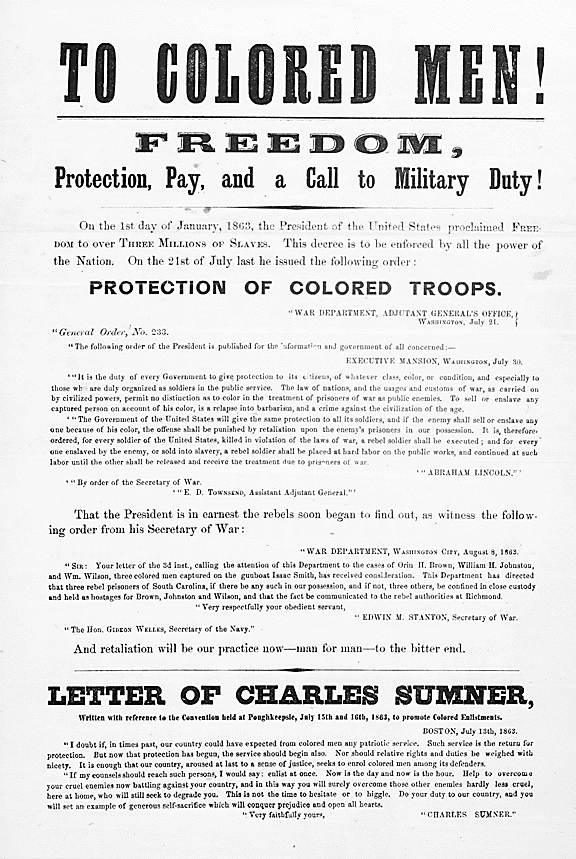Boston [BCF]
Feb. 16,1863, Monday
Dearest Annie,
I arrived here yesterday morning, after a very uncomfortable night in the sleeping-car. I have been at work all day, looking over papers with Hallowell, and talking with Governor Andrew. We have decided to go into camp at Readville, and not at Worcester. It is near enough to Boston to make the transportation of supplies an easy matter, and we see no reason to apprehend any trouble from the white soldiers stationed there. Now that it is decided that coloured troops shall be raised, people seem to look upon it as a matter of course, and I have seen no one who has not expressed the kindest wishes for the success of the project. Governor Andrew’s ideas please me extremely, for he takes the most common-sense view of the thing. He seems inclined to have me do just what I please.
With much affection, your
Rob
Boston [BCF]
Feb. 16,1863Dear Father,
I arrived here yesterday morning. Things arc going along very well, and I think there is no doubt of our ultimate success. I took a long drive with the Governor, and liked him very much. His views about the regiment are just what I should wish. We have decided to go into camp at Readville; as we think it best to plunge in without regard to outsiders. We shall have to do it some time, and it is best to begin immediately; I do not apprehend any trouble out there. We have a great deal of work before us, but every one seems anxious to give us a helping hand, and applications for commissions come in, in shoals. The more money we can get, the better; the transportation of men from other States will cost a great deal.
I will write to Mother soon.In haste,
Your affectionate Son
In five days [after the Boston Journal ad] twenty-five men were secured; and Lieutenant Appleton’s work was vigorously prosecuted, with measurable success. It was not always an agreeable task, for the rougher element was troublesome and insulting. About fifty or sixty men were recruited at this office, which was closed about the last of March. Lieutenant Appleton then reported to the camp established and took command of Company A, made up of his recruits and others afterward obtained.
Early in February quite a number of colored men were recruited in Philadelphia, by Lieut. E. N. Hallowell, James M. Walton, who was subsequently commissioned in the Fifty-fourth, and Robert R. Corson, the Massachusetts State Agent. Recruiting there was attended with much annoyance. The gathering-place had to be kept secret, and the men sent to Massachusetts in small parties to avoid molestation or excitement. Mr. Corson was obliged to purchase railroad tickets himself, and get the recruits one at a time on the cars or under cover of darkness. The men sent and brought from Philadelphia went to form the major part of Company B.
New Bedford was also chosen as a fertile field. James W. Grace, a young business man of that place, was selected as recruiting officer, and commissioned February 10. He opened headquarters on Williams Street, near the post-office, and put out the United States flag across the street.Colored ministers of the city were informed of his plans; and Lieutenant Grace visited their churches to interest the people in his work. He arranged for William Lloyd Garrison, Wendell Phillips, Frederick Douglass, and other noted men to address meetings. Cornelius Rowland, C. B. H. Fessenden, and James B. Congdon materially assisted and were good friends of the movement. While recruiting, Lieutenant Grace was often insulted by such remarks as, “There goes the captain of the Negro Company! He thinks the negroes will fight! They will turn and run at the first sight of the enemy! ” His little son was scoffed at in school because his father was raising a negro company to fight the white men.
…
At camp the New Bedford men, — some seventy-five in number,—with others from that place and elsewhere, became Company C, the representative Massachusetts company.
…
Watson W. Bridgee …[his] headquarters were at Springfield, and he worked in Western Massachusettts and Connecticut. When ordered to camp, about April 1, he had recruited some seventy men.



